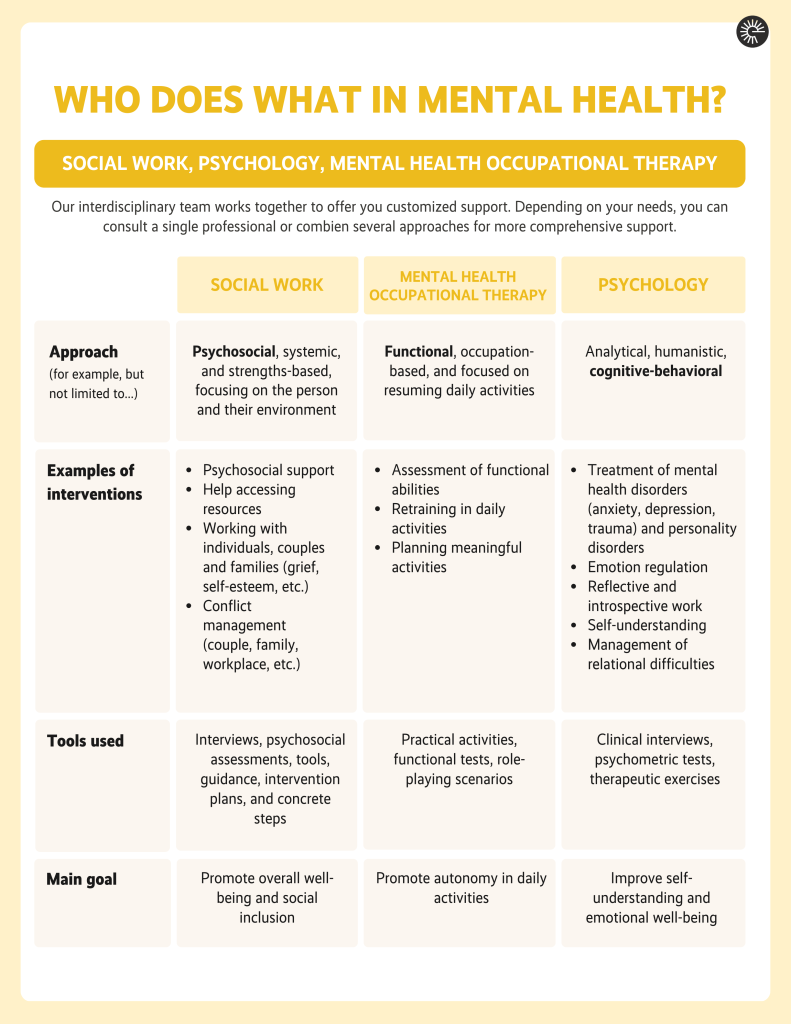
It’s not always easy to know where to turn when going through a challenging time. Social work, psychology, or occupational therapy… Each of these professionals can play an important role in supporting your mental health, but their approaches differ. At Ekinox, our team works together to offer you complete, human-centered mental health care. Here’s how each can help you.
Why consult for mental health support?
We all experience periods of stress, doubt, overload, or anxiety at some point in our lives. Mental health is just as important as physical health, and seeking help is a normal and healthy step. Whether you want to better manage your emotions, find balance in your daily life, or overcome a major challenge, there are resources tailored to your reality.
Social work: practical and human support
A social worker is there to support you when you face personal, relational, or social difficulties. Their role is to help you navigate complex life situations such as:
- Life transitions (adolescence, entering adulthood, retirement)
- Difficult moments (grief, separation, crisis)
- Relationship challenges (family, couple, friends, colleagues)
- Issues related to social roles (parent, student, employee, citizen, etc.)
- Financial or housing difficulties
- Challenges with social autonomy (decision-making, time management, fulfilling obligations)
- Adapting to your environment (social stress, new job, conflicts, social norms)
- Defending rights and protecting vulnerable individuals (access to resources, marginalization)
- And much more.
Through an assessment of your social functioning, the social worker works with you to set realistic goals based on your personal strengths and your environment. Their personalized approach aims to foster overall recovery of psychosocial well-being.
Social work acts on two levels:
- On the individual: providing direct support to people dealing with mental health issues, helping them develop coping strategies, offering tools for emotional regulation, active listening, and guidance, accompanying them through change, promoting self-determination, and ensuring access to necessary resources.
- On the environment: strengthening your support network, creating safe and positive living environments, raising awareness among your loved ones, mediating conflicts, supporting social integration, defending rights, sharing educational resources, and coordinating the services available to you.
Social workers can also evaluate your situation as a whole and refer you to the most appropriate resources or professionals for your needs.
Psychology: better understanding your emotions and thoughts
A psychologist helps you explore your inner world in depth. Using assessment tools and recognized therapeutic approaches, they can intervene in situations such as:
- Anxiety, depression, personality disorders, or mood disorders
- Stress or trauma management
- Self-esteem or interpersonal relationships
- Obsessive-compulsive disorders or eating disorders
- And much more!
Psychology helps you better understand what you are experiencing. By putting words to your emotions, thoughts, and reactions, you can make connections, gain perspective, and initiate change. A psychologist supports you in transforming thinking patterns or behaviors that may be harming your well-being.
A central part of their role is assessing and treating mental health disorders, such as depression, anxiety, or post-traumatic stress disorder (PTSD). All psychologists are also psychotherapists, which authorizes them to provide this type of support. Other professionals, such as certain social workers, may also hold this title.
💡 Only psychologists and physicians can assess mental health disorders and make a diagnosis.
Occupational therapy: regaining balance in meaningful activities
When mental health falters, everyday life can feel heavy: routines collapse, energy drops, focus decreases, and even the simplest tasks can become challenging. This is exactly where occupational therapy can make a difference.
An occupational therapist helps you restore balance despite these limitations, supporting you in resuming your meaningful activities, whether at home, at work, at school, or in the community.
Sessions may include:
- Structuring your day (getting up, eating, taking care of yourself)
- Reestablishing a realistic and reassuring routine
- Identifying and working around thoughts or behaviors that hold you back
- Integrating concrete tools such as mindfulness or relaxation
- Preparing to return to work or school, at your own pace
Mental health occupational therapy takes your whole reality into account: your emotions, physical or cognitive abilities, habits, values, and environment. It’s an action and participation focused approach: because it’s not just through understanding, but through acting in your daily life, that you regain your power to act and achieve lasting well-being.
Three complementary approaches to support your well-being
At Ekinox, our interdisciplinary team works together to offer you personalized support. Depending on your needs, you may choose to consult with a single professional or combine several approaches for more comprehensive care.
For example, someone experiencing anxiety may benefit from working with:
- a psychologist, to better understand their thoughts and address the anxiety disorder;
- an occupational therapist, to help structure their daily life; and
- a social worker, to offer comprehensive support that addresses both the individual (thoughts, emotions, stress management) and their environment, and to provide effective tools for reducing anxiety, without making a diagnosis.
Who does what?

Not sure where to start? We’re here for you
Whether you’re going through a vulnerable time or feeling out of balance in your life, know that you are not alone. Our team will guide you toward the professional best suited to your situation. Together, we can find the path to lasting well-being! Contact us to book an appointment.




